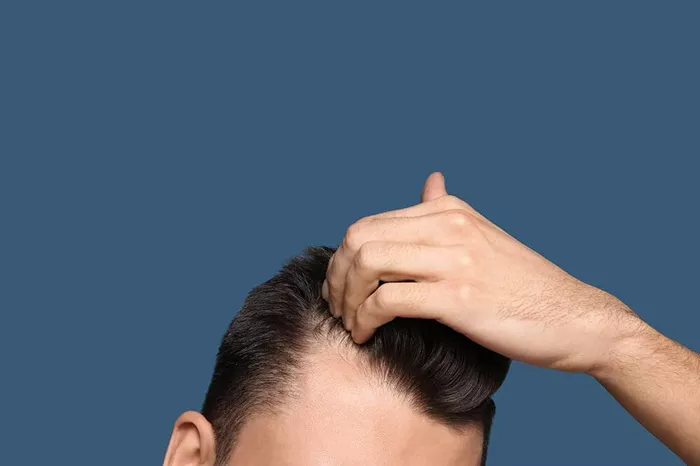Hair loss can be a distressing experience, particularly when it’s triggered by stress. This article explores whether hair can regrow after stress-induced hair loss, how stress affects hair growth, and what you can do to encourage regrowth. We will discuss the different types of stress-related hair loss, their causes, and potential treatments. By the end of this article, you should have a clearer understanding of how to manage stress-induced hair loss and promote healthy hair growth.
Understanding Stress-Induced Hair Loss
Stress can significantly impact your body, and your hair is no exception. Hair loss due to stress can manifest in different forms, including Telogen Effluvium, Alopecia Areata, and Trichotillomania.
Telogen Effluvium
Telogen Effluvium is the most common form of stress-induced hair loss. Normally, hair grows in cycles: anagen (growth phase), catagen (transitional phase), and telogen (resting phase). However, when the body undergoes significant stress, it can push a large number of hairs into the telogen phase prematurely. This results in hair shedding, often noticed as excessive hair loss when brushing or washing your hair. The good news is that Telogen Effluvium is typically temporary.
Alopecia Areata
Alopecia Areata is an autoimmune condition that can be triggered by stress, where the body’s immune system attacks hair follicles, leading to patchy hair loss. This type of hair loss can be more severe and unpredictable, but with proper treatment and stress management, hair can regrow.
Trichotillomania
Trichotillomania is a compulsive hair-pulling disorder often linked to stress and anxiety. Unlike the other types of hair loss, this condition is behavioral, and hair may not regrow if the hair-pulling continues over a long period, leading to permanent damage to hair follicles.
Can Hair Grow Back After Stress-Induced Hair Loss?
The potential for hair regrowth after stress-induced hair loss largely depends on the type of hair loss and how you manage the underlying stress. In many cases, hair does grow back once the stress is under control.
Regrowth in Telogen Effluvium
In cases of Telogen Effluvium, hair typically regrows on its own once the stressful event or period has passed. This process can take several months, as the hair must complete its resting phase before it enters the growth phase again. Patience is key, and taking steps to manage stress can aid in the regrowth process.
Regrowth in Alopecia Areata
Hair regrowth in Alopecia Areata can be more complicated, but it is possible. Treatment may involve topical corticosteroids, immunotherapy, or other medical interventions. Reducing stress is crucial in managing this condition, as stress can exacerbate the autoimmune response.
Regrowth in Trichotillomania
For Trichotillomania, hair regrowth is possible if the individual stops pulling their hair before significant damage occurs. Behavioral therapy, stress management, and in some cases, medications, can help manage this condition and allow hair to regrow.
Factors Affecting Hair Regrowth
Several factors can influence whether and how quickly your hair grows back after stress-induced hair loss. These include:
Severity and Duration of Stress
The longer and more intense the stress, the more significant the hair loss can be. Chronic stress can make it harder for hair to regrow, especially if it has led to long-term hair follicle damage.
Overall Health
Your overall health plays a crucial role in hair regrowth. A balanced diet rich in vitamins and minerals, regular exercise, and adequate sleep can all contribute to healthier hair regrowth.
Hair Care Practices
How you care for your hair can also impact regrowth. Gentle hair care practices, such as avoiding excessive heat styling, harsh chemicals, and tight hairstyles, can prevent further damage and promote regrowth.
See also: Does Yoga Help in Hair Loss? A Comprehensive Analysis
How to Encourage Hair Regrowth After Stress-Induced Hair Loss
If you’re dealing with hair loss due to stress, there are several steps you can take to encourage regrowth.
Stress Management
Managing stress is the first and most crucial step in addressing stress-induced hair loss. Techniques such as mindfulness, meditation, exercise, and therapy can help reduce stress levels and create a healthier environment for hair regrowth.
Healthy Diet
A diet rich in essential nutrients supports hair health. Focus on foods high in vitamins A, C, D, E, zinc, iron, and omega-3 fatty acids. These nutrients are vital for hair growth and can help strengthen your hair.
Supplements
In some cases, supplements may be necessary to fill any nutritional gaps. Biotin, collagen, and multivitamins specifically formulated for hair health can be beneficial. However, it’s important to consult with a healthcare professional before starting any new supplements.
Topical Treatments
There are several topical treatments available that can help stimulate hair growth. Minoxidil is a well-known over-the-counter treatment that can help with regrowth in cases of Telogen Effluvium and Alopecia Areata. Essential oils like rosemary, peppermint, and lavender may also promote hair health when massaged into the scalp.
Professional Treatments
For more severe cases of hair loss, professional treatments may be necessary. Options include corticosteroid injections, laser therapy, and platelet-rich plasma (PRP) therapy. Consulting with a dermatologist or trichologist can help determine the best course of action.
When to See a Doctor
If your hair loss is persistent, severe, or accompanied by other symptoms such as itching or pain, it’s important to seek medical advice. A healthcare provider can help determine the underlying cause of your hair loss and recommend appropriate treatments.
Conclusion
Stress-induced hair loss can be alarming, but in many cases, hair does grow back once the stress is managed. Understanding the type of hair loss you’re experiencing and taking steps to reduce stress are crucial in promoting hair regrowth. A healthy diet, proper hair care, and in some cases, medical treatments, can support the regrowth process. If you’re concerned about your hair loss, consulting with a healthcare professional can provide you with a tailored approach to restoring your hair’s health.


